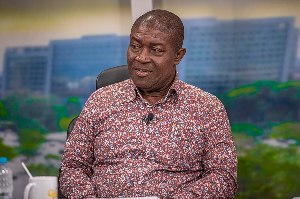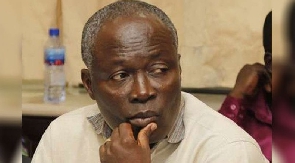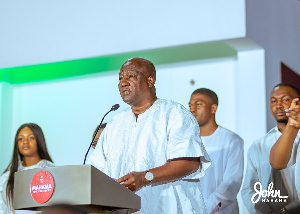Calus Von Brazi
If you ever had doubts that the Ghana Police could be up and doing as expected because of some acts of omission and commission over the past few years, it’s time to do a serious rethink. The police is on “heat” and it definitely looks like these are interesting times for the entire service, even if a few malcontents are still buried in the prison of the past, thereby finding it difficult to adjust to the new realities of contemporary Ghana. I have been monitoring the police service since the advent of Inspector General of Police Paul Tawiah Quaye and what I am finding is as interesting as it is revealing. It is only proper that I share my observations and findings with you my dear reader.
It is usual to expect that any new head of department or agency would introduce novel measures to (i) revive the dampened spirits of departmental agents, (ii) convince beneficiaries of that department’s work that they have a reliable partner, (iii) boost the morale of the department’s operatives and (iv) place them in good stead to effectively perform their roles, duties and assignments to the betterment of society as a whole. It is within these contexts that one finds the new attitude of the Ghana Police Service as a whole, commendable and of good report. A few examples might buttress this position.
In furtherance of a principle introduced by the immediate past interior minister, Dr. Kwame Addo Kufuor, IGP Quaye has rigorously implemented the directive to have all police personnel display their name tags on their uniforms. This in many respects has shown that they as law enforcement agents have themselves taken to an obedience and observance of the law so that very little room is left for the general public to call their loyalty and commitment to law into question. The beauty of the observance of that directive is the opportunity it gives to people to know who they are dealing with and not fearing to volunteer information to some deviant officers as has been the case in that past. In the recent case of the apprehended armed robbers of Atala limited off the Achimota Golf Course, ordinary people were able to mention names of the police personnel that they volunteered information to, largely because of the name tags so that in case anybody wanted to collude with the armed robbers, it would be easy to identify such a bad weed and smoke him/her out. As it is, the police welcomed the cooperation, even if they did not realize that their attitude and self-presentation went a long way in inducing the general public to collaborate with them in the performance and discharge of their duties.
Prior to that encounter, a Peace FM programme had discussed the spate of armed robbery in Ghana and raised concerns about the fear that brazen armed robberies was instilling in the body-politic. Immediately that discussion ended, the police public relations directorate went the extra mile in first of all going through the discussion, taking cognizance of the salient issues and then informing the general public of some measures to help curb the menace. The mentioning of hotlines (911) on almost all networks for instance is a clear case of availing the public with direct access to the operations room in case of any emergency. Even if the number was either switched off or non-functioning at the time it was provided, we now know where to turn to in our moments of need, for not everybody may be in a position to drive to the nearest police station or post when an attack is ongoing or imminent; at least a neighbour or onlooker would know where to turn to or who to call to get some help for any potential victim as a result of the proactive work of the public relations directorate.
Talking about proactive relations: have you noticed that these days, the police have taken to walking around town in groups of four and implementing a “close marking” policing scheme? I just enjoy them stopping suspicious looking people and asking what they are up to, where they are going and who they are. For instance a neighbour who returns home very late at night has been escorted twice to his house by police who wanted to be sure that he indeed lived in the house he claimed to live in and was not being a potential law breaker. Such actions give us hope that given the right conditions of service and the necessary leadership and push, the police would outdo themselves in fostering security within the general public. Maybe this might be a notch too harsh to recall but the truth is that, since the implementation of the “wear your name tag at all times” policy, the level of bribe-taking and gift-giving to police personnel has drastically reduced. I say this in all truth for it appears the fear of ‘exposure’ and easy identification has made serving personnel careful not to be used as scape goats by IGP Quaye in his attempt to rid his domain of miscreants. The “name tag” regime has also ironically emboldened serving police officers to rise to the occasion when the need arises. At 15:30 of Wednesday July 8 for example, I saw a Scorpio vehicle with registration number GP 11 parked opposite the Accra Mall, with its occupant and his aide-de-camp setting a misunderstanding between an irate taxi driver and a rather intransigent passenger. The affable and friendly posture with which this officer handled the issue gave me hope, that all is not lost and indeed, the days of “take him to charge office” for very minor offences are over.
Yet another example: two weeks ago, the most notorious land guard in the Dawhenya area was arrested by the police. This person (name withheld) who was detained at the Tema Police Station earned himself a reputation for denying people access to their legitimate or illegal acquisitions by dint of his nefarious activities and his close collaboration with an ex-police woman (name withheld) who has turned herself into a land salesperson stretching from Prampram to Dawhenya and beyond. Now it was interesting hearing the Tema Police calling this woman’s bluff for the first time in so many years, for she had the reputation of buying off anyone and thereby casting the Tema Police in a very negative light. Perhaps, the fear of IGP Quaye’s “big axe” has taught his subordinates at Tema that it is time to reform or get pushed out. Now why don’t we take the same attitudes to Kasoa, Weija, Gbawe and surrounding areas for example? It is the opinion of this writer that many a people would sleep better, knowing that the days of unbridled disregard of the law are over, thanks to the “new look” police.
The “new look” police have however a lot more to deal with to make the acceptance of their work be without suspicion and the tendency for the public to ridicule their efforts. It may be good to transfer and reshuffle the entire Criminal Investigations Department personnel in order to “cut off” some “familiarity” that in turn engenders compromises that do not inure to the benefit of the society. There are those who believe that by that exercise, their “market” has been spoilt and thus would tend to undermine the efforts of the top hierarchy, all for reasons of personal gain as against institutional detriment; the IGP should be as swift as he is decisive in dealing ruthlessly with such malcontents in the service. Furthermore, we are aware of the ‘near embarrassment’ that the small matter of an AFAG demonstration caused to the service: here we were with the police trying to please the government of the day by claiming a certain and predictable ‘inability to protect the demonstrators’ ostensibly because a certain Obama Hussein Barack was coming to town and thereby going for a ‘restraining order’ only for the sole swearer of the Presidential Oath to defy defiantly both the so-called ‘restraining order’ and the police’s own inclination to give him ‘fan-fool’ respect. All of this could have been avoided if the police stuck to principle and avoided the old ways of doing new things in contemporary times. Of course at the time of writing this article, DSP Ofori of the Public Relations Unit of the Police Service was all over the airwaves, informing the general public of the measures taken to ensure security during Obama’s visit and what alternative arrangements had been made to minimize the inconvenience that those security arrangements implied for the general public. His proactive attitude in matters of police-public relations is worth commending in all truth. It is likely that the inclination towards proactive and friendly policing is what made us record no intimidation, even when the road blocks and their consequent frustrations on passengers and other road users chose to vent their angst on those policemen who manned the temporary “Obama barriers”. At least, despite all the provocative statements of passengers turned pedestrians, they still maintained toothpaste smiles; why would such an attitude not unnerve even the most uncompromising road user?
While at it, one is inclined to also commend ACP Angwubutuge Awuni for his “carrots and sticks” approach to policing duties since he was yanked away from Nima (thereby allowing the Sakawa boys to throw a wild congratulatory party) to Tamale. Reports filtering in from his new operational zone indicate clearly that we are likely to enjoy some respite from the otherwise dire and unwelcome news that the Northern Regional Capital is associated with and noted for. May no “lover of instability” pour disdain, contempt and opprobrium unto his efforts for the people of Tamale and surrounding areas also deserve some peace and tranquility in this Land of Our Death. Talking about stability and tranquility brings me to the issues of rumours and their concomitant effect on the psyche of the good people of Ghana. The police administration has indeed frozen the recruitment of new personnel into the service. Their reasons include the lack of accommodation and other related administrative matters. In the minds of many who have cared to comment about the “freeze” directive, this is a very suspicious move.
The reason for the suspicion is not hard to decipher; there is a certain group of youngsters training to perform security duties allegedly for a private company. This group, which trains and jogs along the Legon-Trinity College-IPS perimeter have within them, some boastful ones who have been belching out the position that sooner rather than later, they shall all be distributed within the military and the police. This writer hopes it is not true for the more dexterous political animals in our society have managed to lay hands on the names of those people. I shudder to imagine what Osei Kyei Mensah Bonsu and his band of “yeni abri koo” MPs would do if any “Atta Police” are used instead of the regular recruitment procedure. Similarly, would it not be foolhardy for anybody to accuse “forcibly retired” Colonel Damoah of recruiting men into the Ghana Armed Forces in ‘unacceptable ways’ and then turn round to replicate same after having rejected fully trained new recruits from taking up their duties? When the NPP government tried to increase numbers in the police service, some people perceived the move as an attempt to load the service with Kufuor loyalists; what would we say to any new recruitment that does not comply with the laid down rules? Shall we call them “Atta sidekicks”?
The current police administration is headed in the right direction without doubt and barring any ‘invisible hand’ playing “dzulor ke police” with them, the society is bound to derive maximum benefit from their improved services. They may not even need to administer “chemical interrogators” to suspects or potential informants, for their new outlook is enough to attract confessions without any inducements. Granted they still have challenges in terms of logistical and operational wherewithal, an appreciative society would always squeeze water out of stone to ensure that the new leaf they have turned is sustained. Now let us see the police weeding out the “docket losers” and intransigent “my friend you just park” personnel and see if the good people of Ghana would not call for IGP Quaye and his men to contest on the ticket of a unified NDC-NPP; that way we can be sure that whether recruits for the future hail from Tadzevu or Sampa, Asokwa or Mpohor Wassa, the good people of Ghana would be appreciative with an appreciation that those we have separated to protect us from the wiles of the deviant are indeed worthy of their privileges and calling. Jehovah Ganan be our defense till we meet herein again!
Click to view details



Opinions of Sunday, 26 July 2009
Columnist: Calus Von Brazi


















